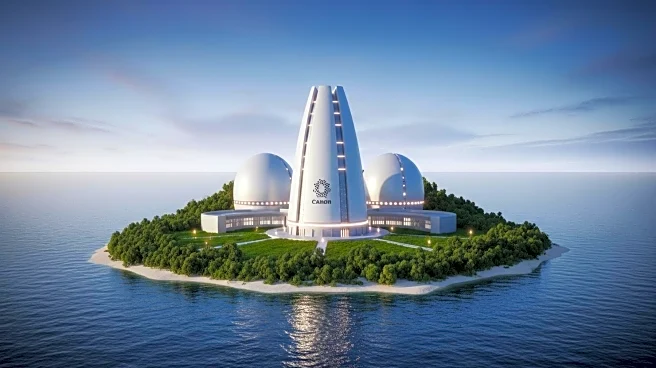What's Happening?
Indonesia has accelerated its timeline for constructing a 250 MWe on-grid nuclear power plant, moving the target from 2032 to 2029. This decision is part of the country's broader energy transition strategy. The Indonesian government is preparing a skilled workforce through the National Research & Innovation Agency (BRIN), which is developing vocational programs in six specializations related to nuclear energy. These include nuclear energy generation, nuclear medical instrumentation, and nuclear fuel technology. The government is also in the process of harmonizing regulations for the Nuclear Energy Programme Implementation Organisation. Additionally, Indonesia has received proposals from five countries, including Canada and Russia, to assist in building nuclear power plants.
Why It's Important?
The advancement of Indonesia's nuclear power plant timeline is significant for several reasons. It reflects the country's commitment to transitioning to cleaner energy sources, which could have implications for global energy markets and environmental policies. For the U.S., this development could influence energy partnerships and competition in the nuclear technology sector. The move also highlights the growing importance of nuclear energy in achieving carbon reduction goals, which could impact U.S. energy policy and industry stakeholders. Companies involved in nuclear technology and infrastructure may find new opportunities in Indonesia's expanding market.
What's Next?
Indonesia plans to start construction of the nuclear power plant by 2027, pending approval from the Nuclear Energy Regulatory Agency. The government is currently evaluating proposals from international partners, which will determine the specific nuclear technology to be used. This decision will likely influence future collaborations and investments in Indonesia's nuclear sector. The development of a skilled workforce will continue, with the first graduates expected by 2028, ensuring the country is prepared for the operational demands of the new plant.
Beyond the Headlines
The shift towards nuclear energy in Indonesia could have broader implications for regional energy security and geopolitical dynamics. As Indonesia becomes a nuclear energy producer, it may alter its energy import and export strategies, affecting neighboring countries and global energy markets. Additionally, the focus on nuclear energy could drive technological advancements and innovation in related fields, potentially influencing global standards and practices.









